 Petzlover
Petzlover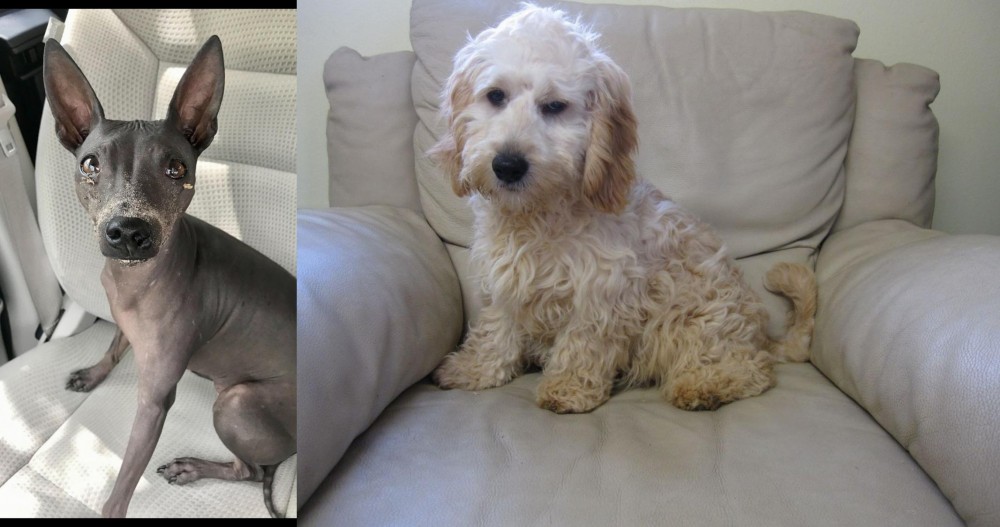 Both American Hairless Terrier and Cockachon are originated from United States. American Hairless Terrier may grow 6 cm / 3 inches higher than Cockachon. Both American Hairless Terrier and Cockachon are having almost same weight. Both American Hairless Terrier and Cockachon has almost same life span. Both American Hairless Terrier and Cockachon has almost same litter size. Both American Hairless Terrier and Cockachon requires Low Maintenance.
Both American Hairless Terrier and Cockachon are originated from United States. American Hairless Terrier may grow 6 cm / 3 inches higher than Cockachon. Both American Hairless Terrier and Cockachon are having almost same weight. Both American Hairless Terrier and Cockachon has almost same life span. Both American Hairless Terrier and Cockachon has almost same litter size. Both American Hairless Terrier and Cockachon requires Low Maintenance.
 Derived from the Rat Terrier, the American Hairless Terrier was born in a litter of Rat Terriers in 1972.
Derived from the Rat Terrier, the American Hairless Terrier was born in a litter of Rat Terriers in 1972.
The evolution of this breed is very different from other hairless breeds. The American Hairless Terrier was independently developed when a hairless pup was produced in a litter of normal Rat Terriers. The owners of this pup, Edwin and Willie Scott attempted to breed her to other Rat terriers but were not successful in having another hairless pup until years later. Then they had a litter with one male and one female hairless puppy.
From that point on they worked with a veterinarian and a geneticist to develop the breed until it was accepted as a separate breed from the Rat Terrier in 2004 and accepted into the AKC in 2016.
The breed is very rare and with hairless dogs breeding only produces about two thirds of the litter as hairless and one third as coated. If a hairless is bred to a coated terrier, the chances of getting hairless puppies are 50% hairless and 50% coated. It is very rare to get a hairless when breed two coated terriers. The difference between the American Hairless Terrier and other hairless breeds is that the hairless gene in most breed is a lethal dominant gene, but in the AHT it is a recessive gene.
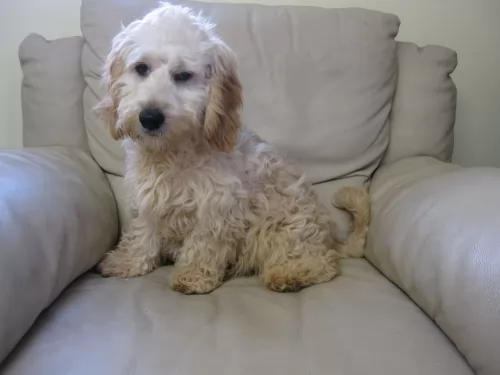 The Cockachon is not a pure bred dog but rather a cross between the Cocker Spaniel and the Bichon Frise. Very little if anything is known about who initially developed the Cockachon. It is known that the International Designer Canine Association (IDCA)registered and recognized the hybrid in 2009.
The Cockachon is not a pure bred dog but rather a cross between the Cocker Spaniel and the Bichon Frise. Very little if anything is known about who initially developed the Cockachon. It is known that the International Designer Canine Association (IDCA)registered and recognized the hybrid in 2009.
It is obviously a relatively new cross breed. The hybrid is also recognized by the American Canine Hybrid Club (ACHC), International Designer Canine Registry (IDCR) and the Designer Dog Kennel Club (DDKC).
 The American Hairless Terrier is similar to it’s breed of origin, the Rat Terrier, and the coated AHT looks very much like a Rat Terrier. They are small to medium in size, very muscular and have more refined features than the Rat Terrier. Their round eyes can be a variety of colors including amber, brown, grey, turquoise and blue. The tail is not docked but rather long and thin.
The American Hairless Terrier is similar to it’s breed of origin, the Rat Terrier, and the coated AHT looks very much like a Rat Terrier. They are small to medium in size, very muscular and have more refined features than the Rat Terrier. Their round eyes can be a variety of colors including amber, brown, grey, turquoise and blue. The tail is not docked but rather long and thin.
The AHT might have eyebrows and whiskers or they might only have whiskers. Their head is broad, and wedge shaped with upright ears. They are an energetic, social and intelligent dog.
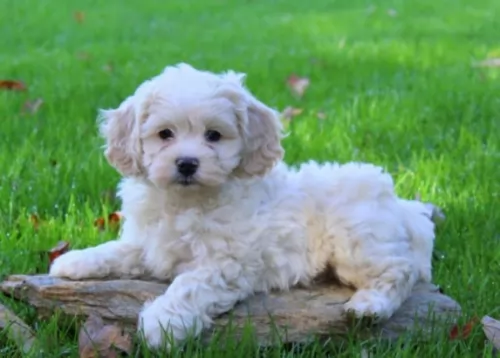 The Cockachon is a cute, little dog very popular in current times. He is small, compact, dark eyes, a round head and black nose. He has a baby face and fluffy hair. It has a furry tail and a blunt muzzle.
The Cockachon is a cute, little dog very popular in current times. He is small, compact, dark eyes, a round head and black nose. He has a baby face and fluffy hair. It has a furry tail and a blunt muzzle.
The Cockachon is a mix between the American Cocker Spaniel and the Bichon Frise. In order to get a better idea of what the hybrid can look like just look at the individual parents. The American Cocker Spaniel is a small dog with a short muzzle and domed head. It is in the Sporting Group, but it is the smallest member of the group. He has a compact, sturdy body and though domed his head is refined.
The Cocker’s stance includes a sloping topline, muscular hindquarters and strong shorter legs adds up to a balanced canine. The coat can be in a wide variety of colors including liver, golden, black, and red. Also, it could be liver and tan, black and tan, roan or tricolors. So, while the Bichon Frise is always white the Cockachon can be any of these colors including white. The types of coats that the Cocker Spaniel and the Bichon Frise have are very different as well.
The Bichon Frise is also a small dog, actually smaller than the American Cocker. The Cockachon usually ends up being about the size of the Bichon at 5-10 kg in weight and 23-30 cm in height. The skull of the Bichon Frise is round rather than domed and the muzzle is also rounded. The tail is long and curly while the Cocker would usually have a cropped tail. The nose and eyes of the Bichon Frise are black and its hair is dense and curly. Unlike the Cocker Spaniel it barely sheds.
Many Cockachon have floppy ears, curly coats and come in any variety of colors though many, many are white.
 This is a curious, intelligent, little dog. They are terrific family dogs with a note to say they are better with older children than with younger. If they are raised with small children, then they are terrific with them. They are territorial, and the children become part of their territory. They will guard and protect them.
This is a curious, intelligent, little dog. They are terrific family dogs with a note to say they are better with older children than with younger. If they are raised with small children, then they are terrific with them. They are territorial, and the children become part of their territory. They will guard and protect them.
They need to play, and this is the biggest requirement for owners. Be sure you have time for them. This is not a couch potato dog. They have a lot of energy and can be destructive and “barky” if that energy is not dissipated. They are terriers through and through and love to “go to ground” whether going in holes they find or digging the holes themselves. They will go after small rodents like chipmunks. They need to be protected in these activities since their skin is vulnerable to scratches and cuts from brush. Their prey drive is strong, so it is important to protect them from themselves in this respect.
They are curious and feisty and every inch the terrier. Affectionate, friendly, and social it is also important to remember they can be scared easily, hurt if play is too rough, and this will trigger barking. They make very good watch dogs.
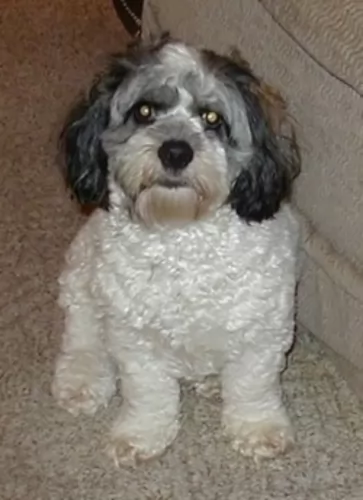 People created the Cockachon to get a small, lap or carry dog that had certain characteristics. These characteristics included a very social, loving dog. He is active and friendly, sweet and gentle. He is loyal, and loves being loved. He is great with other dogs and you can trust him with your children. He is a little independent but very loyal.
People created the Cockachon to get a small, lap or carry dog that had certain characteristics. These characteristics included a very social, loving dog. He is active and friendly, sweet and gentle. He is loyal, and loves being loved. He is great with other dogs and you can trust him with your children. He is a little independent but very loyal.
Like many little dogs he can have serious separation anxiety. Crate training is recommended so that he has a place to feel safe when you are not with him.
 There are not many health problems bothering this sturdy little dog.
There are not many health problems bothering this sturdy little dog.
The American Hairless Terrier has limited breeding stock and it is still a rare breed. Its health problems are mostly related to its hairless state. The breed is highly susceptible to sunburn, rashes, pimples, and allergies. They often need clothing in all seasons to protect them from the heat of the sun or from the cold. The skin must be cleaned regularly often daily with soap and water. This is especially true if sunscreen is used as they are open to skin infections.
Hip dysplasia is also a common issue for this small breed.
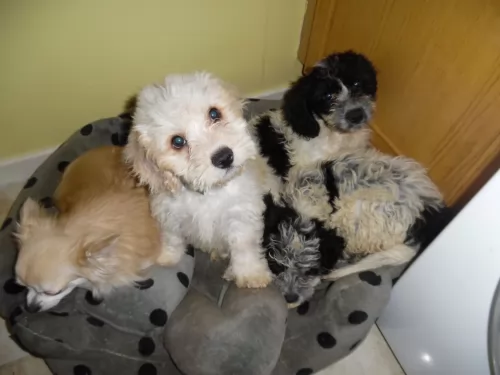 Hybrid dogs seldom have a lot of inherited diseases as they seem to jump a generation but if they do, it can be either a combination of both breeds issues or issues from just one of the breeds in the cross. For the Cockachon these issues include:
Hybrid dogs seldom have a lot of inherited diseases as they seem to jump a generation but if they do, it can be either a combination of both breeds issues or issues from just one of the breeds in the cross. For the Cockachon these issues include:
This loose kneecap issue is common to many small dogs and can cause lameness if not addressed.
Eyelid problems such as the ones that might bother a Cockachon can be found in many small dogs. These include Entropion and Ectropion.
 The American Hairless Terrier has some food needs that might be different from other breeds. They should not be given food that contains soy, wheat or corn. They need to be fed at least 3-4 times a day in small amounts as puppies and twice a day as adult. Be sure to avoid overeating and obesity.
Puppies need about 400 calories a day whether you feed four times or two times. The adult American Hairless Terrier needs about 500-600 calories per day. This might be half a cup to a cup per day.
The American Hairless Terrier has some food needs that might be different from other breeds. They should not be given food that contains soy, wheat or corn. They need to be fed at least 3-4 times a day in small amounts as puppies and twice a day as adult. Be sure to avoid overeating and obesity.
Puppies need about 400 calories a day whether you feed four times or two times. The adult American Hairless Terrier needs about 500-600 calories per day. This might be half a cup to a cup per day.
As previously mentioned the American Hairless Terrier has skin health issues and is also prone to hip dysplasia.
This is a great breed for games if you make them small to match his size. He is energetic, athletic and playful. He loves agility, lure chasing and barn hunt activities. They need a good half hour of vigorous exercise per day.
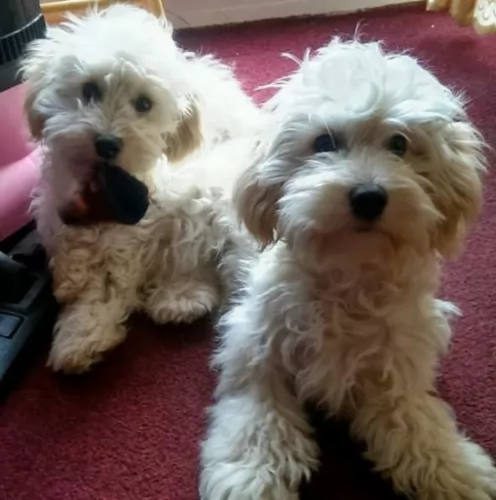 Don’t overfeed a Cockachon. Give him ¾ -1.5 cups of dry food of high quality in two meals per day.
Don’t overfeed a Cockachon. Give him ¾ -1.5 cups of dry food of high quality in two meals per day.
In addition to the issues listed above, the Cockachon is also prone to heart disease and cardiac issues.
The Cockachon has a lot of energy for its size. Make sure it gets plenty of exercise. If walks are the exercise of your choice make sure you walk him for 30 minutes a day. He loves to play, and a back yard would be nice. These little guys do well in obedience but are usually to small for agility.